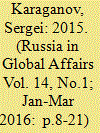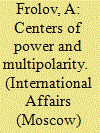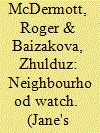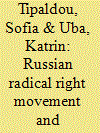| Srl | Item |
| 1 |
ID:
144939


|
|
|
|
|
| Summary/Abstract |
The year 2015 will go down in history as a watershed. Firstly, it was extremely rich in anniversaries. The world marked 70 years since the establishment of the United Nations, an organization that laid the foundations of the postwar system of international relations. It was also 70 years since the tragic beginning of the nuclear age when two Japanese cities were bombed. The emergence of nuclear weapons was perhaps the most important event of the postwar period in world history. Last year saw the 40th anniversary of the Helsinki Final Act, the 25th anniversary of the fall of the Berlin Wall, and the adoption of the Charter of Paris for a New Europe, a document that promised a fair and stable European security system. However, 2015 finally turned that ideal into a shattered dream. Secondly, and most importantly, 2015 marked the end of the postwar era and the post-Cold War period. Now we are entering an era shaped by new major international trends that are coming to the fore. Thirdly, last year was perhaps the most successful for Russian foreign policy in the last quarter of a century. Yet it did not solve Russia's main problem: the deepening stagnation of the economy that can reverse any progress.
|
|
|
|
|
|
|
|
|
|
|
|
|
|
|
|
| 2 |
ID:
151595


|
|
|
|
|
| Summary/Abstract |
IN 1983, VLADIMIR LUKIN* brought out a book that became a landmark not only for the Institute for the U.S. and Canadian Studies of the Soviet Academy of Sciences, where he worked at that time, but for the entire Soviet scholarly community. It was per se remarkable that the book, entitled Centers of Power: Concepts and Realities, was published at a time when, let me remind you, the Soviet-American confrontation and the rivalry between the two world systems reached their peak and, let's face it, each system professed an ideology that essentially painted a black-and-white picture of the world and claimed to be superior to the other system. Few people could have thought in those days that that state of affairs could come to an end any time soon. The United States was getting ready for a grueling struggle with the Soviets. Almost nobody in either country thought that any third party would ever come forward and throw down the gauntlet to the world's two superpowers. Each system was getting ready for its own historic victory and saw the rest of the world as so many pieces on the chessboard.
|
|
|
|
|
|
|
|
|
|
|
|
|
|
|
|
| 3 |
ID:
125361


|
|
|
|
|
| Publication |
2013.
|
| Summary/Abstract |
Russian has announced its concerns about potential threats from Afghanistan spreading into central Asian countries. Roger McDemott and Zhulduz Baizakova assess Russia's efforts to bolster security in the region
|
|
|
|
|
|
|
|
|
|
|
|
|
|
|
|
| 4 |
ID:
133751


|
|
|
|
|
| Publication |
2014.
|
| Summary/Abstract |
This article examines how, if at all, the mobilisation of the Russian Movement Against Illegal Immigration has had an impact on changes in Russian policies. Little is known about the outcomes of radical right movements in general or the Russian radical right in particular. The Movement Against Illegal Immigration has arguably played a role in shaping negative public attitudes towards immigration. On the other hand, the Russian government has not adopted any clear nationalistic anti-immigration policy frame. We show that disruptive events of Movement Against Illegal Immigration's mobilisation have caused reactions in terms of the elite discourse on immigration and restrictive immigration legislation.
|
|
|
|
|
|
|
|
|
|
|
|
|
|
|
|